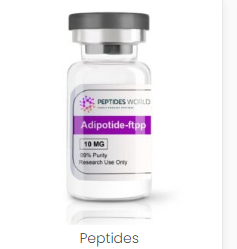
Adipotide: Exploring the Potential of this Fat-Loss Peptide
Obesity is a major health concern worldwide. It is linked with various serious health problems such as diabetes, heart disease, and cancer. Despite numerous weight loss programs, pills, and surgeries available in the market, a significant number of people still struggle with obesity. Adipotide is a promising fat-loss peptide that has been gaining attention in recent years due to its potential to help individuals achieve their weight loss goals. In this blog post, we will explore what adipotide is, how it works, its benefits and drawbacks, and its potential future applications.
What is Adipotide?
Adipotide is a synthetic peptide that was first developed by researchers at The University of Texas MD Anderson Cancer Center in the early 2000s. Its primary purpose was to target cancerous cells by cutting off their blood supply. However, during pre-clinical trials on overweight mice, it was discovered that adipotide also reduced body fat mass significantly.
How does it work?
Adipotide works by binding to specific receptors found on the surface of fat cells called alpha-2C adrenergic receptors. Once bound to these receptors, adipotide triggers programmed cell death or apoptosis in fat cells by disrupting their blood supply. The dead fat cells are then flushed out of the body through natural processes.
Benefits and Drawbacks
One significant benefit of adipotide is its ability to target visceral fat—the type of fat that accumulates around organs and increases the risk of various diseases such as diabetes and heart disease. Studies have shown that adipotide can reduce visceral fat mass by up to 39% within four weeks.
However, there are also some drawbacks associated with adipotide use. One major drawback is that it cannot selectively remove only excess body fat; instead, it targets all types of fat in the body indiscriminately, including essential fat. This means that adipotide use can lead to potential nutrient deficiencies and other health issues associated with low levels of essential fat.
Potential Future Applications
While adipotide is not yet approved for human use, it has shown promising results in animal studies. It is currently undergoing clinical trials to assess its safety and efficacy in humans. If approved, adipotide could provide a new and effective weight loss therapy for individuals struggling with obesity.
Conclusion:
Adipotide is a promising fat-loss peptide that could potentially revolutionize the weight loss industry. While it has shown significant benefits in reducing visceral fat mass, it also comes with some drawbacks that need to be considered. Further research is needed to determine whether adipotide can safely and effectively be used in humans. However, if approved, it would provide an additional tool for individuals seeking to achieve their weight loss goals and improve their overall health.